七年级英语下册unit3第一课时导学案
人教版七年级下英语教学案unit3

2、本节课,你认为的难点是什么?
3、请总结本单元所学重点知识:
【达标测评】
一、句型转换
1.I want to see the lions because they're cute.(就画线部分提问)
____ ______you want to see the lions?
8.My sister is ________(有点)shy.
9.I ________(想)to see the lions.
10.Look!How ________(有趣的)the animals are.A.see B.seeingC.to see D.sees
教师复备栏
或学生笔记栏
茶亭中学七年级英语导学案
(2)clever与cute同义,在口语中有时可通用,但“clever”主要用来形容人或动物的脑子灵活,理解事物快。
(3)smart“聪明的”,可修饰人也可修饰动物。
2.let’s与let us
(1)let’s是let us的缩写,但let’s指向对方提出建议,并且让对方与自己一起去做某事,意为“让咱们”。
4.Why do you like ________(长颈鹿)?
5.Do you like ________(大象)?---Yes,I do.
6.I want to see the pandas________ (因为) they’re cute.
7.Why does your father like ________(企鹅)?
7.小的______________ 8.澳大利亚的_____________
9.友好的______________ 10.聪明的______________
新外研版七年级英语下册导学案(M3-Unit 1讲义)

Module 3 Making PlansUnit 1 What are you going to do at the weekend?第一课时一、学习目标(1) 理解对话并能用所给信息谈论周末计划。
(2) 掌握本单元的单词,学会用be going to do 句型。
二、学习重点go over ,on , nobody, at , nothing, silly, fantasticWhat are you going to do…? I’m going to …Are you going to…? Yes ,we are./ No, we aren’t.三、学习难点be going to do sth. ;would like的用法课前预习一、使用说明与学法指导1、必须掌握重点单词。
2、预习要注意:(1)5分钟完成单词的学习,要求读音正确。
(2)15分钟完成课文的预习,所有生单词都画出来并标注汉语,疑点做出标记,并找出导学案上的词组和句子。
3、将预习中不能解决的问题标出来,并写在我的疑问处。
二、教材助读请同学们预习课文的基础上写出下列词组,并在书本上将这些词组画线。
查询我的电子邮件______________复习功课________________上钢琴课______________________看电影__________________野餐________________________帮助做家务_________________在周末______________________在周六的早上_______________呆在家里____________________ 别傻了_____________________三、预习自测题1.翻译下列单词picnic________ housework ______ else ________ nobody _______nothing_______ fantastic________2.翻译下列短语Do homework_________ help with the housework __________see a movie___________ Check emails____________have a piano lesson________ have a picnic___________Go over lessons___________ a fantastic weekend______________四、我的疑问_________________________________________________________________课内探究1、T: What day is it today? S:Today is Friday/...T:What's the weather like?S:It's sunny/...T:What are you going to do at the week end? S:I'm going to have a picnic/...2、利用句型,根据实际情况回答问题1、—What are you going to do this Sunday?—I'm going to...2、—What is your mother going to do at the weekend? —She is going to ...3、—what are your friends going to do at the weekend?—They are going to...3、听录音掌握大意并完成Activity4.(一)1、听力练耳Listen and match (听录音,连线组成短语,然后朗读这些短语,背诵)2、Write the phrases in Activity1 and the picture.(Activity2)(二)对话处理读前听Listen to the dialogue, and answer the questions.1、Is Daming going to check his email?2、Is Betty going to a party at a friend’s home on Saturday evening?3、What is Daming going to do on Saturday afternoon?听后读:最大声、最准确的朗读对话一遍,说一说Betty和Daming的计划。
Module3Unit1导学案英语七年级下册
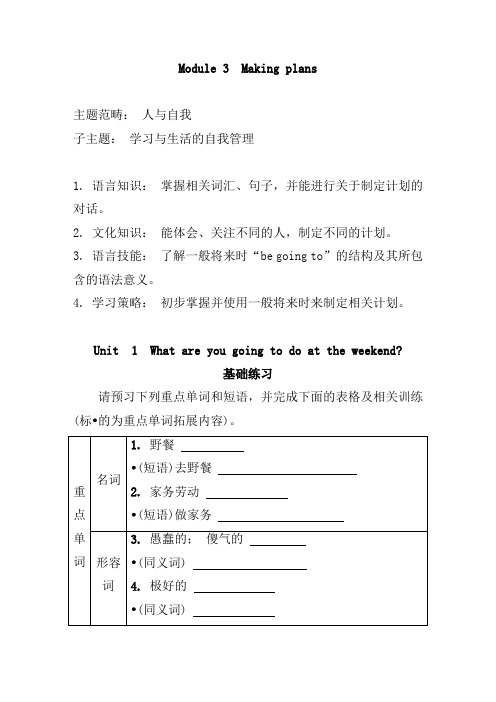
Module 3Making plans主题范畴:人与自我子主题:学习与生活的自我管理1. 语言知识:掌握相关词汇、句子,并能进行关于制定计划的对话。
2. 文化知识:能体会、关注不同的人,制定不同的计划。
3. 语言技能:了解一般将来时“be going to”的结构及其所包含的语法意义。
4. 学习策略:初步掌握并使用一般将来时来制定相关计划。
Unit 1What are you going to do at the weekend?基础练习请预习下列重点单词和短语,并完成下面的表格及相关训练(标•的为重点单词拓展内容)。
学以致用根据语境或提示,完成填空。
1. What else (其他) are you going to say?2. On Sunday morning, Sam usually gets up very late.3. Let's go out and have a picnic (野餐) tomorrow.4. Don't be silly (傻气的), Mike.5. Lily often helps her mother do the h ousework at the weekend.6. Tony is going o ver his lessons at home because there will be an exam tomorrow.7. They are going to see a fantastic (极好的) film this weekend.8. He often makes fun of(取笑) others, so likes him.9. His father usually gets up at six o'clock and (check) his email.10. She is going to buy some food because there is nin the fridge(冰箱).佳句仿写用句中黑体词或短语仿写句子。
人教版七年级英语下册unit3 how do you get to school导学案

Unit3 How do you get to school?导学案I.单词火车_____自行车_____分钟______车站,停止_____河,江_______村庄________桥_____船____梦想,做梦_____村民_______离开______六十_____八十_____一百______七十______九十____千米,公里________远的____新的,刚出现的_____开车______居住,生活______横过,跨过______每一,每个_____介于….之间_______许多______像,怎么样_______害怕,畏惧_______真的,符合事实的_______II.词组1.到达学校_______________2.乘火车_____________3.乘地铁______________4.骑自行车_______________5.怎么到达学校________________6. 105_________________7.多远__________________8. 骑自行车到学校______________9.每天___________________10.步行去上学________________开车去上班_______________乘飞机去北京______________11.我不敢确信_________________12.大约_________13.十公里远_______________________14.好的锻炼________________15.到达家______________ 16.坐他父亲的车______________17.穿过河__________________18.实现,成为现实_______________19.认为_______________20.在…和…之间____________________21.在索道上_____________________III.句型1.你怎样去学校?我骑自行车。
鲁教版七年级下册英语全册导学案含答案
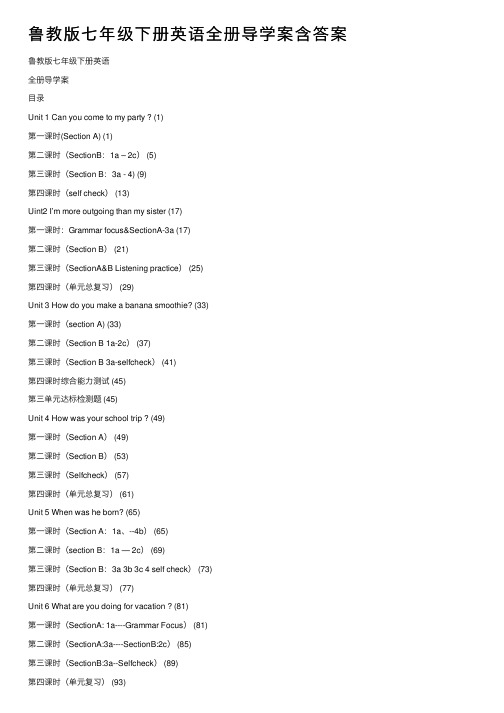
鲁教版七年级下册英语全册导学案含答案鲁教版七年级下册英语全册导学案⽬录Unit 1 Can you come to my party ? (1)第⼀课时(Section A) (1)第⼆课时(SectionB:1a – 2c) (5)第三课时(Section B:3a - 4) (9)第四课时(self check) (13)Uint2 I’m more outgoing than my sister (17)第⼀课时:Grammar focus&SectionA-3a (17)第⼆课时(Section B) (21)第三课时(SectionA&B Listening practice) (25)第四课时(单元总复习) (29)Unit 3 How do you make a banana smoothie? (33)第⼀课时(section A) (33)第⼆课时(Section B 1a-2c) (37)第三课时(Section B 3a-selfcheck) (41)第四课时综合能⼒测试 (45)第三单元达标检测题 (45)Unit 4 How was your school trip ? (49)第⼀课时(Section A) (49)第⼆课时(Section B) (53)第三课时(Selfcheck) (57)第四课时(单元总复习) (61)Unit 5 When was he born? (65)第⼀课时(Section A:1a、--4b) (65)第⼆课时(section B:1a — 2c) (69)第三课时(Section B:3a 3b 3c 4 self check) (73)第四课时(单元总复习) (77)Unit 6 What are you doing for vacation ? (81)第⼀课时(SectionA: 1a----Grammar Focus) (81)第⼆课时(SectionA:3a----SectionB:2c) (85)第三课时(SectionB:3a--Selfcheck) (89)第四课时(单元复习) (93)Unit 7 I’ m going to be a basketball player. (97)第⼀课时(1a----Grammar Focus) (97)第⼆课时Section A3a- SectionB 2c) (101)第三课时(SetionB3a—self-check) (105)第四课时(检测你雄厚的综合实⼒吧!) (109)Unit8 Could you please clean your room? (113)第⼀课时Section A (1a----Grammar Focus) (113)第⼆课时(3a----2c) (117)第三课时(3a-self-check) (121)第四课时 (125)Unit 9 What’s the best radio station? (129)第⼀课时(section A 1a-2c) (129)第⼆课时(section A 3a - self check) (133)第三课时(单元复习) (137)Unit 10 It’s a nice day ,isn’t it ? (141)第⼀课时(Section A:1a---4) (141)第⼆课时(Section B:1a--- 4) (145)第三课时单元复习 (149)Unit 1 答案 (153)unit2参考答案 (155)Unit3 参考答案 (157)单元达标检测题 (158)Unit 4 参考答案 (160)Unit 5参考答案 (163)unit6 答案 (165)unit7 参考答案 (166)Unit 8参考答案 (167)Unit 9 参考答案 (171)Unit10参考答案 (172)Unit 1 Can you come to my party ?亲爱的同学们,你曾参加或举⾏过聚会吗? 欢迎你⾛进Unit 1 , 相信你会成为风度翩翩的绅⼠或举⽌⽂雅得体的⼥⼠的!第⼀课时 (Section A)当你被别⼈邀请时,你都会做到恰如其分、彬彬有礼吗?相信你没问题!学法导引:学会情态动词can 的⼀般疑问句式及其肯定回答和否定回答。
(人教版)七年级下册英语导学案:Unit 3 How do you get to school
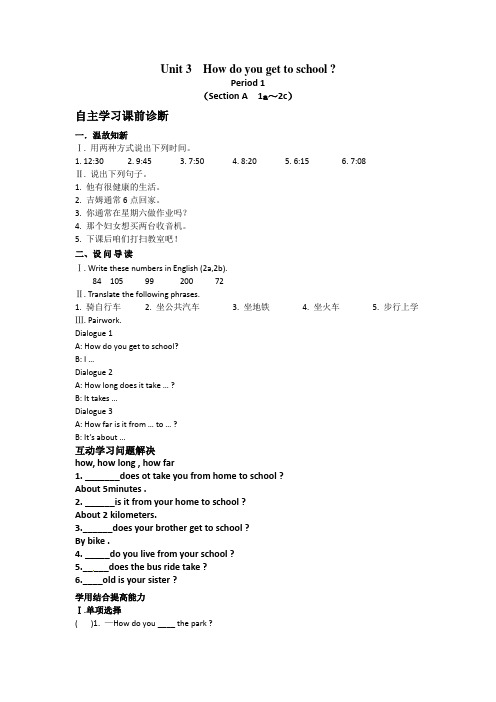
Unit 3 How do you get to school ?Period 1(Section A 1a~2c)自主学习课前诊断一.温故知新Ⅰ. 用两种方式说出下列时间。
1. 12:302. 9:453. 7:504. 8:205. 6:156. 7:08Ⅱ. 说出下列句子。
1. 他有很健康的生活。
2. 吉姆通常6点回家。
3. 你通常在星期六做作业吗?4. 那个妇女想买两台收音机。
5. 下课后咱们打扫教室吧!二、设问导读Ⅰ. Write these numbers in English (2a,2b).84 105 99 200 72Ⅱ. Translate the following phrases.1. 骑自行车2. 坐公共汽车3. 坐地铁4. 坐火车5. 步行上学Ⅲ. Pairwork.Dialogue 1A: How do you get to school?B: I …Dialogue 2A: How long does it take … ?B: It takes …Dialogue 3A: How far is it from … to … ?B: It’s about …互动学习问题解决how, how long , how far1. _______does ot take you from home to school ?About 5minutes .2. ______is it from your home to school ?About 2 kilometers.3.______does your brother get to school ?By bike .4. _____do you live from your school ?5._____does the bus ride take ?6.____old is your sister ?学用结合提高能力Ⅰ.单项选择( )1. —How do you ____ the park ?—I ____ a bus.A. get; byB. get to; takeC. get; take( ) 2. —Does your father go to work _________bus?—No, he ________his bike .A. by; byB. take; ridesC. by; rides( ) 3. —_______is it from your home to school?—It’s about 2 kilometers.A. HowB. How longC. How far( ) 4.—I walk to school.___________?—I walk to school, too.A. How about youB. How do you doC. How think ( ) 5. How long does it _______ you to go home?A. takeB. needC. getⅡ. 用英语单词完成下列算式1. 40+30=70 _____+_____=_____2. 12+26=38 _____+_____=_____3. 50+60=110 _____+_____=_____4. 18-6=12 _____-_____=_____5. 20+36=56 _____+_____=_____Ⅲ. 按要求完成句子,每空一词1.My father goes to work by bike.(对划线部分提问)your father to work?2.Mary goes to school by subway.(改为同义句)Mary the subway school.3.He often watches TV for two hours in the evening.(对划线部分提问)does he often watch TV in the evening?4.His dictionary is 50 dollars.(对划线部分提问)is his dictionary?5.This is her bike. (改为同义句)This bike is .课堂小节,形成网络填入适当的句子补全对话A: Hello, Bill.B: Hello, Mike.A: 1._____________?B:I get up at six.A: 2._____________?B: I have some bread for breakfast.A: 3._____________?B: No, I don’t like salad.A: 4._____________?B:I go to school by bus.A: And last question. 5._____________?B: My favourite subject is English.A: Thank you.B: You’re welcome.Unit3 How do you get to school ?Period 2(Section A 2e~3c)自主学习课前诊断一、温故知新Useful phrases:1.到校______________2.上班____________3. 到家_________________4. 到这儿________________________5. 到那儿______________6.去上学______________________________7.去上班____________________ 8.回家___________________9.去那儿______________________10. .乘地铁________________11.乘公共汽车______________12.乘火车_________________13. 乘飞机___________14.乘出租车________________________15.乘船________________16.骑自行车_________________17.步行_____________ 18.开车送他上学______________19.多远________________20.多久________________二、设问导读Ⅰ. Read 2e (P14) and complete the conversation.A: Hey, Jane. Is this your new bike?B: Yes. I ride it to school everyday. 1. ____________________A: I usually take the bus.B: 2. ____________________A: I’m not sure —about 10 kilometers? The bus ride takes about 20 minutes. 3. _________B: About 15 minutes by bike. It’s good exercises.A: Yeah, well, have a good day at school.B: You, too.Ⅱ. Read Grammar focus (P15). Then finish 3a and 3b (P15) with your partner.三、自学检测Ⅰ. Pairwork: Practice 2e (P14) with your partner and make your own conversation. Then act it out.Ⅱ. 单项选择( ) 1.—Is this bike________?—No, it’s not ________.A. your; mineB. yours; mineC. your; my( ) 2. —When do they get _______ Beijing?—They get ________ there at 8:00.A. to; toB. / ; /C. to; /( ) 3. The _________takes about _________ hour.A. bus ride; anB. bus ride; aC. ride bus; an( ) 4. Going to school by bike is _________.A. a good exercise.B. good exercises.C. good exercise.( ) 5.—Does she take the bus to school?—_________.She goes by bike.A. Yes, she doesB. No, she doesn’tC. I’m not sure互动学习问题解决用take 填空。
七年级英语Unit 3 Topic 1 SectionC 导学案
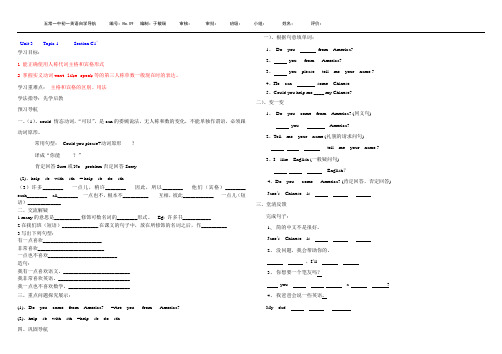
五常一中初一英语自学导航编号:No.09 编制:于敏瑞审核:审批:班级:小组:姓名:评价:Unit 3 Topic 1 Section C1`学习目标:1 能正确使用人称代词主格和宾格形式2 掌握实义动词want like speak等的第三人称单数一般现在时的表达。
学习重难点:主格和宾格的区别、用法学法指导:先学后教预习导航一、(1)、could 情态动词,“可以”,是can的委婉说法,无人称和数的变化,不能单独作谓语,必须跟动词原形。
常用句型:Could you please+动词原形------?译成“你能------?”肯定回答Sure或No problem否定回答Sorry(2)、help sb with sth = help sb do sth(3)许多________ 一点儿,稍许________ 因此,所以________ 他们(宾格)________ each________ all________ 一点也不,根本不__________ 互相,彼此____________ 一点儿(短语)_____________二、交流解疑1.many的意思是__________,修饰可数名词的________形式。
Eg: 许多书___________2.在我们班(短语)______________,在课文的句子中,放在所修饰的名词之后,作__________.3.写出下列句型:有一点喜欢_______________________非常喜欢__________________________一点也不喜欢___________________________造句:我有一点喜欢语文。
__________________________我非常喜欢英语。
____________________________我一点也不喜欢数学。
________________________三、重点问题探究展示:(1)、Do you come from America? =Are you from America?(2)、help sb with sth =help sb do sth四、巩固导航一)、根据句意填单词:1、Do you from America?2、you from America?3、you please tell me your name ?4、He can some Chinese.5、Could you help me ____ my Chinese?二)、变一变1、Do you come from America? (同义句)you America?2、Tell me your name.(礼貌的请求问句)tell me your name ?3、I like English.(一般疑问句)English?4、Do you come America? (肯定回答、否定回答)Jane’s Chinese is三、堂清反馈完成句子:1、简的中文不是很好。
七级英语下册UnitHowdoyougettoschool导学案(无答案)(新版)人教新目标版
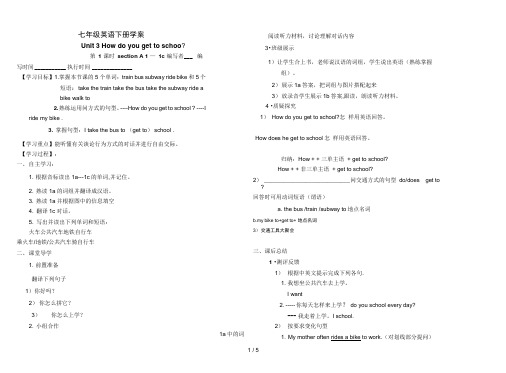
七年级英语下册学案Unit 3 How do you get to schoo?第 1 课时section A 1 —1c 编写者___ 编写时间___________ 执行时间______________【学习目标】1.掌握本节课的5个单词:train bus subway ride bike 和5 个短语:take the train take the bus take the subway ride abike walk to2. 熟练运用问方式的句型。
----How do you get to school ? ----Iride my bike .3. 掌握句型:I take the bus to (get to) school .【学习重点】能听懂有关谈论行为方式的对话并进行自由交际。
【学习过程】:一、自主学习:1. 根据音标读出1a---1c的单词,并记住。
2. 熟读1a的词组并翻译成汉语。
3. 熟读1a并根据图中的信息填空4. 翻译1c对话。
5. 写出并读出下列单词和短语:火车公共汽车地铁自行车乘火车/地铁/公共汽车骑自行车二、课堂导学1. 前置准备翻译下列句子1)你好吗?2)你怎么拼它?3)你怎么上学?2. 小组合作阅读听力材料,讨论理解对话内容3•班级展示1)让学生合上书,老师说汉语的词组,学生说出英语(熟练掌握组)。
2)展示1a答案,把词组与图片搭配起来3)放录音学生展示1b答案,跟读,朗读听力材料。
4 •质疑探究1)How do you get to school?怎样用英语回答。
How does he get to school怎样用英语回答。
归纳:How + + 三单主语+ get to school?How + + 非三单主语+ get to school?2) ___________________________ 问交通方式的句型do/does get to ?回答时可用动词短语(谓语)a. the bus /train /subway to地点名词b.my bike to+get to+ 地点名词3)交通工具大聚会三、课后总结1 •测评反馈1)根据中英文提示完成下列各句.1. 我想坐公共汽车去上学。
- 1、下载文档前请自行甄别文档内容的完整性,平台不提供额外的编辑、内容补充、找答案等附加服务。
- 2、"仅部分预览"的文档,不可在线预览部分如存在完整性等问题,可反馈申请退款(可完整预览的文档不适用该条件!)。
- 3、如文档侵犯您的权益,请联系客服反馈,我们会尽快为您处理(人工客服工作时间:9:00-18:30)。
Unit3 How do you go to school?导学案
SectionA1a-2e
【学习目标】
一、学习下列单词和短语: train, bus, subway, take the subway, ride, bike, ride a bike
二、掌握和运用下列句型:
1.How do you get to school?
2. How does Mary get to school?
3.How long does it take..... ?
4.How far is it from.....to........?
三、学会使用60-100的数字。
【学习重点】
1) how /how far /how long 引导的特殊疑问句.
2) 乘坐交通工具的表示方法.
3)It takes / sb some time to do sth .
【学习难点】
—How do you get to school? —I take the …/ride …/ walk…
—How does Mary get to school? —She takes the subway.
—How long does it take? —It takes forty minutes.
—How far is it from… to… —It's… kilometers.
一.创境激趣
Enjoy a video about means of transportation
二.自主学习
(一)、请根据中文意思写出下列单词。
1. 火车_____________
2.公共汽车_____________
3.地铁_____________
4. 自行车_____________
5.骑,旅程_____________
6.分钟_____________
(二)、请认真阅读课本P13-14,找出以下短语。
1.坐火车_____________
2.坐公交车_____________
3.坐地铁_________
4.骑自行车___________
5.步行__ __________
6.艺术俱乐部__________
(三)、请认真阅读课本P13-14,完成下列句子。
1.-- 你怎样去学校?--我骑自行车。
-- _______ do you ______ school ? -- I_______ . 2. Mary怎样去学校?--她坐地铁。
-- _______ Mary ______ school ? -- She _______
三.合作探究
探究一:Listen again, and fill in the blanks.
Boy: How do Bob and Mary to school?
Girl: Bob takes the and Mary takes the .
Boy: How does John get to school?
Girl: He the bus.
Boy: How do Paul and YangLan get to school?
Girl: They . Look, there they are now!
Boy: Jim walk to school?
Girl: No, he . He his bike.
探究二:运用特殊疑问词how,学会谈论如何去某地,和同伴练习以下对话,然后编出自己的对话。
For example: A:--How does Mary get to school?
B:--She takes the subway.
A:--How about you?
B:--I ride my bike.
探究三:调查你们组的同学,关于他们平常如何从家去学校。
就此编对话,请和你的组员练习此对话。
并把报告展示给全班同学。
For example:A:How do you get to school? B: I .....
A: How long does it take.....? B: It takes .....
A:How far is it from… to…..? B: It’s about …
四.归纳内化
1,how引导的一般现在时的特殊疑问句可用how来提问交通方式;用how long提问时间长短,即时间段;用how far提问距离。
How用来提问交通方式:How do/does sb. go to get to…?
其答语有:(1)take a /the+表示交通工具的名词;
(2)by+表示交通工具的名词;
(3)on/in+限定词+表示交通工具的名词。
例句:—How do you go to work every day? 你每天怎样去上班?
—I take a bus to work. = I go to work by bus/on the bus.我乘公汽去上班。
2,It takes + 人+ 时间+ to do … (事情) 是一个十分常用的句型,其中动词take 表示“花费(时间)”。
例如:
It usually takes me five to ten minutes to get there by bus.
乘坐公交车去那儿我通常要花五到十分钟的时间。
五.应用拓展
一,Translate and write them down.
1. -- 通常你怎样去上学。
-- 我通常骑车去上学。
-- _____ ___ you usually go to school?
-- I usually _____ ____ ______ to school.
2. 地铁站离汽车站大约有300米远。
The subway station is _______ 300 _______ _____ ______ the bus stop.
3. 他通常每天用一小时做作业。
It usually ______ _____ half an hour _____ _____ his homework every day.
二.句型转换
1. I take the bus to get to school. (改为同义句)
2.She takes the car to get to work. (改为同义句)
3. They walk to school. (改为同义句)
4. It takes him 35 minutes to walk there. (对划线部分提问)
5. . I spent two hours doing my homework yesterday. (改为同义句)
It _____ me two hours ____ _____ my homework yesterday.
三.单项选择
1. --- does Tony get to school every day?
---He takes the subway.
A. What
B. How
C. When
2. ---Is this your bike, Jane?
---Yes, it is. I it to school every day.
A. get
B. take
C. ride
3. ---Does Peter walk to school?
--- .He takes the bus.
A. No, he doesn't
B. Yes, he does
C. No, he isn't
4.I usually walk home after school at 4:30 p.m.
A./
B. to
C. with
5. --- is it from your home to the bus stop? ---It’s about 2 kilometres.
A. How long
B. How far
C. How many。
